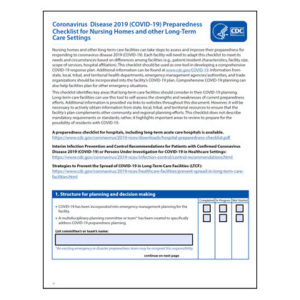4 ways psychology can improve your bottom line
It’s common knowledge that mental health and physical health are connected, but are you aware that applying mental health concepts to your organization could save you money? Observe the four theories below and my hypothetical long-term care scenarios. Who knows, this could be you.
1. Take a tip on workplace behavior from industrial-organizational psychology.
The nurse searched through the file drawer for a Consultation Form, flipping through one torn, faded manila folder after another. “I don’t have time for this now!” she said to no one in particular, eyeing a stack of paperwork at the nursing station. “I’ll get it on the way back from lunch.” But the afternoon brought a new admission, and the referral never occurred. This didn’t escape the notice of the state surveyors, who cited it as a deficiency. The missed referral also resulted in a downturn in the health of the resident, who required a readmission to the hospital. Her family later filed a lawsuit for negligence. The nurse, visiting Starbucks while searching for a new job, watched the barista prepare her coffee drink. All his equipment was in reach and clearly labeled. With a few movements, her drink was set on the counter for pick up—the same way it’s done in every Starbucks everywhere. She sighed. If only that Consultation Form had been within reach…. |
Borrow franchise-like organization systems to streamline functioning, with standardized tools in standardized locations, facilitating movement of staff between facilities and from unit to unit, which cuts time spent on repetitive tasks. Five minutes per staff member spent searching for a pantry key, a syringe or some clean linens quickly adds up, even if they don’t contribute to a citation, hospital readmission or lawsuit. Get organized and save yourself a bundle.
2. Create a psychological sense of community to keep your referrals in-network.
Wilhelmina Jones attended the Bright Sunshine Healthcare System adult day care program until a fall brought her to the local hospital. While she was there, Nancy, the Bright Sunshine representative, visited her regularly, bringing cards and messages from her adult day care friends. Wilhelmina was eventually discharged to Bright Sunshine Rehabilitation and Skilled Nursing Center. Despite the excellent rehab care she received, Wilhelmina realized she couldn’t manage living at home alone anymore, and Nancy helped her transition to the nearby Bright Sunshine Assisted Living. Wilhelmina didn’t return to the nursing home until a year after that, when she was readmitted for long-term care. Her room held cards from her assisted living friends, and Nancy had left a welcome balloon. “This wasn’t what I was hoping for,” she told the psychologist upon her admission, “but at least I know people here.” A month later, Wilhelmina appeared more settled. “I’m going to be the Resident Council President,” she happily told the psychologist. “I guess I’m a Bright Sunshine gal!” |
Streamline every transition and provide continuity of care, so that residents become part of your LTC family rather than leaving for other networks during changes in care levels. The hallmarks of psychological community are when members feel they have influence over the group (a useful resident council goes a long way), get their needs met (for example, by easily transitioning from one suitable level of care to another) and share an emotional connection (provided by staff members who know the residents).
3. Use principles of psychological contract theory to increase productivity and reduce turnover.
Felix listened as his supervisor outlined the procedure for the laundry room. “In my last facility,” Felix said quietly, “we did it differently, and it saved us a lot of time.” He waited anxiously to see if his comments would be welcomed. “Oh, really,” his supervisor said, “tell me a little more about it. We’re always looking for ways to improve our system here.” With a sigh of relief, Felix outlined his method, which saved the facility money as well as time, and earned Felix a bonus day off despite being new to the nursing home. Ten years later, he still proudly told the story of how his workplace cared enough to respect his experience and implement his ideas. |
Psychological contract theory suggests companies innovate from the bottom up, gathering ideas from those on the frontlines and increasing openness and positive perceptions of the organization by employees. Management can’t know the most efficient method for line workers unless they get feedback from those doing the jobs. Harness their knowledge and reap the benefits.
4. Incorporate the philosophy of positive psychology and improve business outcomes.
The residents were busy in the recreation department, preparing their handicrafts for the street fair Bright Sunshine Healthcare System was sponsoring on Saturday. Family members stopped at the front desk, signing up to work the carnival booths. Staff members dropped in on their off hours to lend a hand when carnival day arrived. Bright Sunshine rep Nancy acted as the emcee. At the close of the street fair, an administrator announced the sum of money raised by the Bright Sunshine family for the local battered women’s shelter—the residents’ charity of choice. The mayor joined the administrator and Resident Council President Wilhelmina Jones in presenting the check to the shelter’s director. The mayor thanked Bright Sunshine for being such a valuable contributor to the neighborhood. |
Create a mission that unifies and mobilizes the entire community, from the corporate headquarters to the residents to the families. Include your neighborhood for an outstanding public relations opportunity that generates good will (and referrals) for your LTC network. Research, such as that by Youssef and Luthans, finds better business outcomes such as job satisfaction and organizational commitment when employees are more engaged in their work.
Eleanor Feldman Barbera, PhD, is a speaker and consultant on psychological issues in long-term care, and author of the forthcoming book, The Savvy Resident's Guide: Everything You Wanted to Know About Your Nursing Home Stay, But Were Afraid to Ask. For more information, visit Dr. Barbera's website, www.mybetternursinghome.com.
Related Articles
Topics: Articles , Leadership , Staffing











